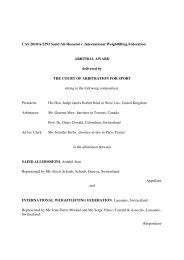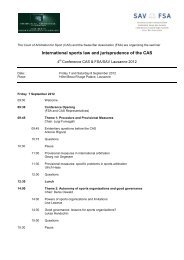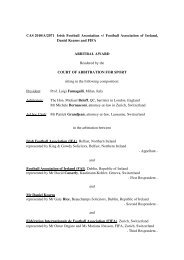(CAS) Bulletin - Tribunal Arbitral du Sport / TAS
(CAS) Bulletin - Tribunal Arbitral du Sport / TAS
(CAS) Bulletin - Tribunal Arbitral du Sport / TAS
You also want an ePaper? Increase the reach of your titles
YUMPU automatically turns print PDFs into web optimized ePapers that Google loves.
2011, Art. 156 no. 11 ff) if the evidentiary proceedings<br />
endanger the protected interests of one of the parties<br />
or of the witness.<br />
There is no doubt that the personality rights as well<br />
as the personal safety of a witness form part of his/<br />
her interests worthy of protection (CPC-SCHWEIZER,<br />
2011, Art. 156 Rn. 6). However, according to the<br />
predominant view an abstract danger in relation<br />
to these interests is insuffi cient. Rather there must<br />
be a concrete or at least a likely danger in relation<br />
to the protected interests of the person concerned<br />
(DIKE-Komm-ZPO/LEU, 2011, Art. 156 Rn. 8).<br />
Furthermore, the measure ordered by the tribunal<br />
must be adequate and proportionate in relation to<br />
all interests concerned. The more detrimental the<br />
measure is to the proce<strong>du</strong>ral rights of a party the<br />
more concrete the threat to the protected interests of<br />
the witness must be.<br />
Referring to ECHR case law (the Doorson, van<br />
Mechelen and Krasniki cases), the Swiss Federal<br />
<strong>Tribunal</strong> considered that the use of protected<br />
witnesses, although admissible, must be subject to<br />
strict conditions: the witness shall motivate his/<br />
her request to remain anonymous in a convincing<br />
manner; and the court must have the possibility<br />
to see the witness. In such cases, the right to a fair<br />
trial must be ensured through other means, namely<br />
a cross-examination through “ audiovisual protection ”<br />
and an in-depth verifi cation of the identity and the<br />
reputation of the anonymous witness by the court.<br />
Finally, the Swiss Federal <strong>Tribunal</strong> stressed that the<br />
ECHR and its own jurisprudence impose that the<br />
decision is not “solely or to a decisive extent ” based on an<br />
anonymous witness statement.<br />
Again referring to the ECHR jurisprudence, the<br />
Swiss Federal <strong>Tribunal</strong> concludes that (i) the witness<br />
must be concretely facing a risk of retaliations by the<br />
party he/she is testifying against if his/her identity<br />
was known; (ii) the witness must be questioned by the<br />
court itself which must check his/her identity and the<br />
reliability of his/her statements; and (iii) the witness<br />
must be cross-examined through an “audiovisual<br />
protection system”.<br />
The above-mentioned jurisprudence and principles<br />
established by the ECHR and the Swiss Federal<br />
Court led <strong>CAS</strong> in a previous case and based on the<br />
merits and specifi c circumstances of that case to<br />
allow the testimonies of protected witnesses (<strong>CAS</strong><br />
2009/A/1920).<br />
However, in this case, in light of the aboveexamined<br />
criteria, the Panel found that, in the form<br />
requested, the measure requested by WADA was<br />
disproportionate in view of all the interests at stake.<br />
In particular the Panel found that it was insuffi ciently<br />
demonstrated that the interests of the witness worthy<br />
of protection were threatened to an extent that could<br />
justify a complete protection of the witness’ identity<br />
from disclosure to the Respondents, thus, curtailing<br />
the proce<strong>du</strong>ral rights of the Respondents to a large<br />
degree.<br />
The Panel sought an alternative solution by proposing<br />
to the parties a manner of hearing and cross-examining<br />
the witnesses that it deemed would more adequately<br />
balance the interests at stake. The proposal would<br />
have enabled the Panel to be satisfi ed that it could<br />
hear the witness’ testimony in a reliable form, while<br />
suffi ciently accounting for Mr Contador’s defence<br />
rights, including his counsels’ need to prepare the<br />
cross examination in an effi cient manner given the<br />
witnesses’ severe accusations against Mr Contador.<br />
However, neither WADA nor Mr Contador agreed to<br />
the Panel’s proposal.<br />
Given the above circumstances and in light of all the<br />
submissions of the parties, the Panel decided to deny<br />
WADA’s request to hear such witness without the<br />
disclosure of his/her identity to the opposing party.<br />
2. Witness statement of Mr Javier Lopez<br />
On the fi rst day of the hearing (21 November 2011),<br />
the Respondents declared not to object the summary<br />
of Mr Lopez’ expected testimony presented by<br />
WADA on 15 November 2011.<br />
3. Admissibility of newly presented evidence<br />
Mr Contador considered that the recently published<br />
news he fi led on 16 November 2011, concerning<br />
cattle contamination in Denmark, established that<br />
clenbuterol contamination is a worldwide problem<br />
and that he intended to rely on such documents<br />
<strong>du</strong>ring the course of the hearing.<br />
WADA considered the news story to be irrelevant.<br />
The meat in this news story was pork and not veal or<br />
beef. Furthermore, according to the article, Denmark<br />
only exported meat contaminated with salmonella<br />
and not clenbuterol-contaminated meat.<br />
Considering the positions of both the Athlete and<br />
WADA, the Panel decided to admit the news story to<br />
the fi le, taking into account the position of WADA<br />
regarding its irrelevancy.<br />
Jurisprudence majeure / Leading cases<br />
-<br />
108





